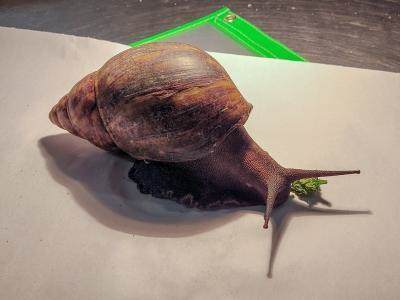Mox, a member of the CBP’s Beagle Brigade, sniffed out a Giant African Snail
By Diego Flammini
Staff Writer
Farms.com
Mox and the Giant African Snail he sniffed out.
A very good member of the Customs and Border Protection’s (CBP) K9 unit intercepted a pest capable of damaging the U.S. ag sector.
On Nov. 8, Mox, a dog in the CBP’s Beagle Brigade, used his nose to sniff out something suspicious in a passenger’s luggage from Nigeria at the Hartsfield-Jackson Atlanta International Airport.
Inside the luggage was a live Giant African Snail.

“This was a significant discovery for our agriculture K9 team—a critical component of our nation’s frontline defense against all animal pests that threaten our agricultural resources,” Clay Thomas, area port director for CBP Atlanta, said in a statement.
The Giant African Snail can reach up to eight inches in diameter, is known to feed on more than 500 plants including peanuts, beans, grains, peas, cucumbers and melons.
And if no plants are available, the snails are known to eat paint or stucco on houses.
In addition, the snail has both male and female organs, allowing it to produce up to 1,200 eggs per year.
And the snail poses a threat to humans too.
The snail can carry the rat lungworm parasite, a nematode known to cause meningitis in humans.
The snail is currently present in Florida, Hawaii and the Caribbean.
In July 2022, for example, the Florida Department of Agriculture established a quarantine area after a snail was found in Pasco County.
This snail is so invasive, it ranks #2 on the Invasive Species Specialist Group’s list of the 100 worst invasive alien species in the world.
Only the Australian acacia, a tree that reduces native biodiversity and increases water loss from riparian zones, is ranked above the Giant African Snail.
The luggage Mox sniffed out also contained prohibited goat meat, cow skins, melon seeds and vegetables.